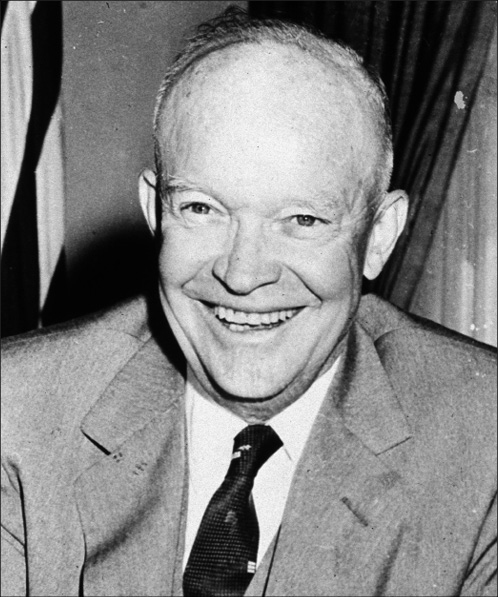10 JEAN EDWARD SMITH on Dwight D. Eisenhower
“Eisenhower was always able to make the decisions that you expected a commander to make. He never waffled. He was never hesitant.”
BOOK DISCUSSED:
Eisenhower in War and Peace (Random House, 2012)
Jean Edward Smith has an interesting twist on what has been the conventional wisdom about Dwight D. Eisenhower: gifted and experienced general, and not a gifted or successful president.
Eisenhower has been seen as an extraordinary military leader who was the mastermind of D-Day, which led to the Allies ultimately defeating Germany. And there is no doubt that Eisenhower was the Supreme Allied Commander in charge of the invasion.
But Smith points out that Eisenhower had missed combat in World War I; spent much of his military career in office or staff positions (he was a longtime aide to Douglas MacArthur); was much less qualified to lead a large combat mission than Omar Bradley, George Patton, or George Marshall, who had long been expected to lead the invasion of Europe; and late in his career was given combat military leadership positions in Italy and in Africa, in large part to give him the experience he would need to later lead the D-Day invasion.
Eisenhower’s strength, Smith notes in the interview, was not combat experience as much as the ability to get along with political leaders. Churchill really liked him, as did FDR, who ultimately made the decision on D-Day leadership.
Interestingly, Eisenhower was not sure that the D-Day plan would work, and prepared communications acknowledging defeat and accepting responsibility for a failed invasion. And it might well have failed. Smith points out that Hitler’s best panzer troops were available to repel the invading Allies, and probably could have done so. But Hitler had to give the orders to use those troops, and no one dared wake him while he slept during the initial hours of D-Day.
As the Supreme Allied Commander who devised the successful D-Day invasion of Europe, which ultimately led to the demise of the Nazi regime, Dwight Eisenhower was a living legend, admired by all Americans. Not surprisingly, both the Democratic and Republican Parties wanted Eisenhower as their presidential nominee. Seven years after World War II, Eisenhower revealed that he was a Republican, accepted the party’s nomination, and was easily elected in 1952 and reelected in 1956.
As president, Eisenhower was seen as passive or even dull, and the period of his presidency was considered relatively tranquil, certainly when compared to the period of the 1960s with the civil rights movement, the Kennedy and King assassinations, the Vietnam War, the student protests, and the musical and sexual revolutions brought about by, respectively, the Beatles and the pill.
The result was a view that the Eisenhower presidency, occurring during quiet times, did not accomplish all that much. Many scholars and historians considered that it made less of an impact on history than his war service did.
In recent years, the relative tranquility, not to mention the peace and prosperity, of the Eisenhower years has had scholars reassessing this presidency. That is perhaps because of the challenging presidencies that followed Eisenhower’s, and also because his low-key, steady-as-she-goes leadership style is now much better appreciated.
Jean Edward Smith is among the scholars leading this reassessment of the Eisenhower presidency. A political science and history professor, Smith has also written very well-regarded biographies of Supreme Court Justice John Marshall, General Ulysses S. Grant, and General Lucius Clay, the American military governor of occupied Germany after World War II.
According to the conventional wisdom, Eisenhower was not very strong or effective as a government leader, and he left behind a record of little presidential accomplishment. But Smith points out that this traditional view has not been very accurate or very fair.
Smith notes that President Eisenhower kept the peace for eight years (no American soldier was killed in combat during his presidency); ended the military conflict in Korea; thwarted the rise of McCarthyism; proposed and built the Interstate Highway System, without impacting the federal budget; enforced the law on desegregation of public schools in the South by sending federal troops to Little Rock, Arkansas; and, with Canada, built the Saint Lawrence Seaway.
Smith’s exhaustive research also led him to confirm some interesting facts about Eisenhower:
- He did seek permission during World War II from his senior military leader, George Marshall, to divorce Mamie Eisenhower in order to marry his “driver,” Kay Summersby. Permission was strongly denied, and that seemed to end the subject.
- He selected Richard Nixon as his running mate without even talking to him. (He had met Nixon once.) Eisenhower relied completely on his political advisors, who surprised him by saying the vice-presidential selection was actually his choice and not the Republican Convention’s.
- He wanted Nixon to remove himself from the ticket in 1952 after a controversy arose about the political fund Nixon used to pay his expenses. Eisenhower also wanted Nixon to take another position, such as secretary of defense, during a presumed second term. In both situations, Nixon resisted strongly, and Eisenhower simply did not use his authority to force his preferences. He apparently felt more comfortable exercising the military power he once held than the political power he later came to hold.
How would history have changed if Eisenhower had been allowed to divorce his wife, or if Nixon was forced from the ticket in 1952 or in 1956? We will never know.
Our conversation made me appreciate the extraordinary depth of Professor Smith’s research and storytelling abilities, and I made certain to read his other biographies shortly afterward. Professor Jean Edward Smith passed away in the summer of 2019. I am grateful for his devoted and singular contributions to the study of American history.

